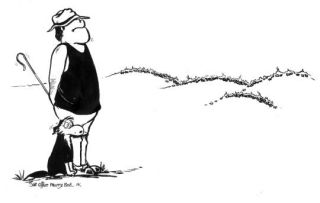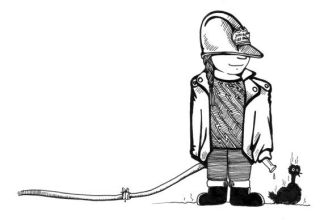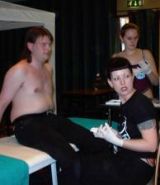The Hills are Alight
HAVE YOU ever realised the extent to which various cultures brainwash their children? Thirty years on, I still react to some pretty intensive brainwashing I received during my formative years in Tasmania.
During the recent heat wave, I sat threading beads by an open window, feeling the hot, dry air blow over me. I became increasingly restive-there was something I should be doing, now, what was it? Something to do with the combination of hot weather and a dry, strong wind.
Yes: I should be filling the bathtub and all other available receptacles with water, that's what it was. Furthermore, I should be checking that there wasn't any long, dry grass anywhere near the house, getting the garden hoses connected to the outside taps, turning off electrical equipment and pulling the plugs out of the sockets. Also, I should close all the windows and doors, making sure no pets or children were inside. I think that was all. At some point you had to be ready to start hosing down the outside walls of the house or any wooden fences.
Damp, muggy heat-not a problem. Hot, still, dry days-you start getting slightly twitchy. But a hot, dry, windy day and all your internal alarm bells ring, when you're a Tasmanian Junior Fire Ranger.
The British live in a country that is basically damp. If Christianity had formed in England, hell would be soggy. Tasmania is not soggy. All those lovely, damp clouds blow in from the ocean, hit the mountain ranges on the west of the island and drop their loads. The lovely rain runs down the mountains and back into the sea. The now-unencumbered, light, fluffy clouds then head east where all the people and crops and sheep are, manage the occasional little dribble and float gaily out to sea.
A notable exception was the summer I first took Steve home to meet my parents. "Will we need waterproofs?" he asked me anxiously when we were packing. "Does the pope need contraceptives?" I replied.
We had so much rain that roads were closed due to landsides and the Midlands resembled a rice paddy. Presumably, the pope gave birth secretly and had the child adopted. A few years later, when more normal weather patterns had reasserted themselves, Steve's father, who had lived in Lebanon, India and Arabia, was to fly over the Midlands and remark that it looked like a desert.
After a couple of dry years, the ground cracks open, you can drive along river beds and farmers shoot their sheep because it's kinder than letting them die of thirst and starvation. My mother tells me that '99 has been one of these years.
Spectacular sunsets are admired in England. In Tassie a colourful sunset is a bad sign-it means there's smoke in the air. (Red sky at night: sheep are alight.) Here, they're normal as the air is so polluted.
Tasmania was the first place to have its very own hole in the ozone layer and the first place in the world to ban aerosols. It rather focuses your thoughts when you and all your belongings are under a blazing hot sun, surrounded by miles of tinder-dry vegetation with a high content of eucalyptus oil. The critical word here is oil. Australian vegetation spontaneously combusts under the right conditions, and some types of seeds don't germinate until they've actually been roasted. In the heat of a fire, a big gum tree won't just catch alight with a nice slow burn-it will explode, shooting burning shrapnel for hundreds of yards.
"It's all obscure islands in the Southern Hemisphere; what difference does it make?"
In February of 1967, with temperatures of 110° F, Tasmania suffered a huge bushfire of disastrous proportions. Most of the south of the island was burning at one point. I was nine and I no longer remember how many people or animals died. Thousands of houses were destroyed. At school that afternoon we were evacuated from the buildings and sent out to sit on the football ground. Smoke made it as dark as late evening, we could see cinders and ash in the air and the red glow on the surrounding hillsides. Some of us weren't allowed home until very late.
My family's weatherboard house had caught fire but had been put out-adults had been sent home from work to try to save their houses. I remember blistered paint and rooms full of soot. The wooden fences were gone, a neighbour had let out the hens but had not known about our pet rabbit in its box in the other end of the chicken coop. We told ourselves that the poor little sod would have suffocated first.
To this day the countryside is dotted with the remainders of homes less lucky: a brick hearth and chimney is all that is left of many little wooden houses which burned that day. You can still drive up Mount Wellington and see blackened trunks, only some of which have grown back. No other fire before or since has travelled so high up the cooler, more temperate sides of the mountain.
The government decided that such a thing should never happen again. Laws were passed specifying stringent control of dry vegetation near houses, firebreaks were bulldozed in the bush, every tiny little hamlet built a big, serious fire station with proper shiny red trucks and all the men trained as volunteer fire fighters.
"Just makin' trouble for the VFD"
Fire prevention officers regularly visited schools and drilled children in bush fire avoidance and survival. Not all of what I learned has stuck: for instance if you were in a car and got caught in a fire which you couldn't out-run-fanned by a strong wind, a fire can move amazingly fast-you had to get out of the car because the petrol tank would explode. But I don't remember what the heck you had to do when you were out of the car and surrounded by fire with no handy waterhole to jump into: baste yourself in a light vegetable oil or barbecue sauce, maybe, and just lie there thinking of your ancestors.
I think the main aim of these talks was really to stop us little buggers playing with matches while we smoked behind the bike shed. A secondary effect was to turn a generation of wide-eyed moppets into merciless junior informers, telling on anyone such as neighbours or parents who threw a lighted fag out of a car window or let the weeds grow too long near the back of the house. At the end of the fire prevention officers' talks, they distributed rather nice badges, and I wore mine with pride for years.

Tasmanians weren't the only people to brainwash their children, though, and I bet what I learned was more useful than "duck and cover."
--Giulia De Cesare
|
Previous Article |
Next Article |
![[Plokta Online]](../onlinelogo.jpg)



